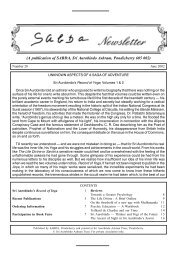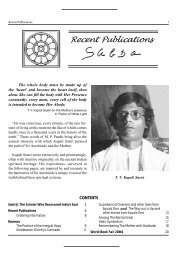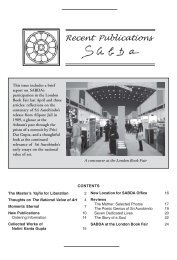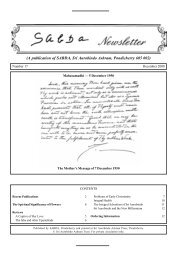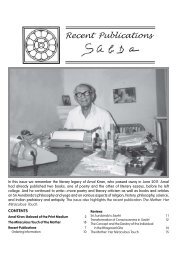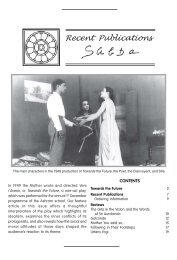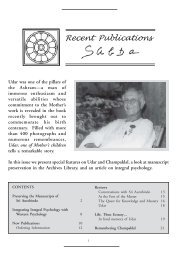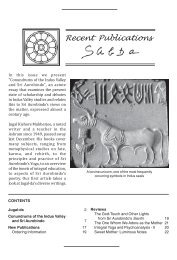Recent Publications - Sabda - Sri Aurobindo Ashram
Recent Publications - Sabda - Sri Aurobindo Ashram
Recent Publications - Sabda - Sri Aurobindo Ashram
Create successful ePaper yourself
Turn your PDF publications into a flip-book with our unique Google optimized e-Paper software.
24 <strong>Recent</strong> <strong>Publications</strong><br />
The book under review is titled Deliberations on The<br />
Life Divine, Volume One. Its author is Ananda Reddy.<br />
Dr. Reddy is the Director of <strong>Sri</strong> <strong>Aurobindo</strong> Centre for<br />
Advanced Research<br />
(SACAR). The volume<br />
under consideration is<br />
the transcribed and<br />
edited version of the first<br />
of his series of talks on<br />
<strong>Sri</strong> <strong>Aurobindo</strong>’s The Life<br />
Divine. It presents a<br />
simplified explanation of<br />
the main arguments of the<br />
first six chapters of The<br />
Life Divine. The book is<br />
Man can be distinguished from<br />
other creatures of the earth<br />
because of one basic element in<br />
him—discontentment! Man is the<br />
only creature who is dissatisfied<br />
with what he is or what he has. And<br />
that is the greatest quality or guna<br />
of the human being.<br />
p.174<br />
meant for the lay person and the neophyte. By his own<br />
admission, Reddy points out that the focus of editing<br />
has not been to produce a well-written book but rather<br />
to retain the tenor of the original talks. Reddy dispenses<br />
with the literary and philosophical idiom and presents<br />
his ideas plainly. Yet this is not a bald presentation.<br />
Reddy quotes from various sources to buttress his<br />
explanations. Each chapter is followed by lecture notes<br />
which are a concise summary of the arguments. The<br />
book also emphasizes the continuity of thought that<br />
links the various chapters of The Life Divine. This will<br />
be very helpful for a newcomer to <strong>Sri</strong> <strong>Aurobindo</strong>’s<br />
thought, or even to philosophy in general.<br />
forbidding to some people as they first approach this<br />
monumental work. Reddy’s lectures are easy to digest<br />
and will help allay any concern a lay reader may have<br />
of The Life Divine being beyond the<br />
scope of his ability to understand.<br />
“Things should be made as simple as<br />
possible but not simpler.” If one may<br />
point out a flaw in an otherwise<br />
welcome volume it is this: in his<br />
eagerness to be intelligible to the<br />
layman Reddy sometimes<br />
compromises on the real purport of <strong>Sri</strong><br />
<strong>Aurobindo</strong>’s words. To give but one<br />
example, on page 16 of his book Reddy<br />
points out that human progress towards the next step<br />
in evolution comes through revolutionary individuals<br />
like Leonardo da Vinci, Albert Einstein, Swami<br />
Vivekanada and others. Now in this example<br />
Vivekananda is the only spiritual figure. When <strong>Sri</strong><br />
<strong>Aurobindo</strong> talks about the higher and deeper<br />
experiences which are abnormal to humanity as coming<br />
through “by a revolutionary individual effort”, surely<br />
he did not have Leonardo da Vinci or Albert Einstein in<br />
mind—however great by human standards they might<br />
have been. In fact in a letter <strong>Sri</strong> <strong>Aurobindo</strong> writes, “One<br />
man who earnestly pursues the Yoga is of more value<br />
than a thousand well-known men.”<br />
When we consider the value that <strong>Sri</strong> <strong>Aurobindo</strong><br />
attached to The Life Divine the didacticism of Reddy’s<br />
approach can be justified. Part of The Life Divine’s<br />
complexity stems from the complexity of the subject<br />
matter itself, which is mostly far removed from the<br />
workaday world. The other element is the architectonic<br />
style which <strong>Sri</strong> <strong>Aurobindo</strong> adopts for his rational<br />
presentation of spiritual experience. These, coupled<br />
with <strong>Sri</strong> <strong>Aurobindo</strong>’s austere classical prose, may appear<br />
For a person not trained or gifted in meditative or even<br />
speculative reason this volume can be of immense help.<br />
And if it leads aspirants to read The Life Divine on their<br />
own it would have fulfilled its humble but useful<br />
purpose.<br />
— Hemant Kapoor<br />
Hemant is an M.Sc. in Chemistry from I.I.T., Kanpur. He is<br />
on the editorial team of the Mother India journal.<br />
His interests include poetry and philosophy.<br />
An omnipresent Reality is the truth of all life and existence whether absolute or relative, whether<br />
corporeal or incorporeal, whether animate or inanimate, whether intelligent or unintelligent;<br />
and in all its infinitely varying and even constantly opposed self-expressions, from the<br />
contradictions nearest to our ordinary experience to those remotest antimonies which lose<br />
themselves on the verges of the Ineffable, the Reality is one and not a sum or concourse.<br />
The Life Divine, Chapter V: The Destiny of the Individual<br />
Published by SABDA, Puducherry. Printed at <strong>Sri</strong> <strong>Aurobindo</strong> <strong>Ashram</strong> Press, Puducherry.<br />
© <strong>Sri</strong> <strong>Aurobindo</strong> <strong>Ashram</strong> Trust, June 2007. For private circulation only.



